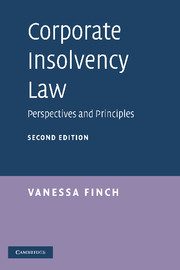Book contents
- Frontmatter
- Contents
- Acknowledgements
- Table of cases
- Table of statutes and other instruments
- List of abbreviations
- Introduction to the second edition
- PART I Agendas and objectives
- PART II The context of corporate insolvency law: financial and institutional
- PART III The quest for turnaround
- PART IV Gathering and distributing the assets
- PART V The impact of corporate insolvency
- 16 Directors in troubled times
- 17 Employees in distress
- 18 Conclusion
- Bibliography
- Index
16 - Directors in troubled times
Published online by Cambridge University Press: 05 June 2012
- Frontmatter
- Contents
- Acknowledgements
- Table of cases
- Table of statutes and other instruments
- List of abbreviations
- Introduction to the second edition
- PART I Agendas and objectives
- PART II The context of corporate insolvency law: financial and institutional
- PART III The quest for turnaround
- PART IV Gathering and distributing the assets
- PART V The impact of corporate insolvency
- 16 Directors in troubled times
- 17 Employees in distress
- 18 Conclusion
- Bibliography
- Index
Summary
The rules and processes that make up insolvency law operate as a set of incentives and constraints that influence how company directors behave at times of both good and bad corporate fortune. This chapter considers how those incentives and constraints operate and examines the assumptions and philosophies that underpin the role of the company director in insolvency law. The analysis offered here continues the approach set out in chapter 2 and asks whether current insolvency law deals with directors in a manner that renders directors appropriately accountable, makes the best use of directorial expertise, fosters efficiently produced outcomes and is consistent with the fair treatment of directors and parties affected by directorial behaviour. For the purposes of clarity of exposition, the issue of accountability will be considered first, since this involves a mapping out of the broad array of influences and constraints that insolvency law applies to directors – a mapping exercise that should provide a useful background to the discussions of expertise, efficiency and fairness that follow.
Accountability
Directorial accountability can operate through a variety of devices – which will be considered below – but the purposes to be served by such devices may also vary. Insolvency law, for instance, might set out to punish an errant director; to protect creditors at risk from directorial actions; or to compensate parties who have suffered losses at the hands of directors.
- Type
- Chapter
- Information
- Corporate Insolvency LawPerspectives and Principles, pp. 677 - 753Publisher: Cambridge University PressPrint publication year: 2009

